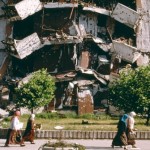Dir. by Michael Winterbottom
I had planned to write a longish post today about Michael Winterbottom’s Welcome to Sarajevo. I’ve queued up a bunch of his films and hope to watch as many of them as possible in the coming weeks. I was really moved by the film, but I knew, even as I was watching, that I would have been as moved (if not moreso) by a mediocre documentary on the subject. It was the images of the bombed-out city and its dying and hopeless citizens that created the film’s dramatic urgency. When I was aware of Winterbottom’s mise-en-scene at all, I was frustrated by its haphazardness — odd cuts are scotchtaped together by forced music cues, the camera jumps too often into the subjective perspective of unimportant characters (an after-the-fact narrative justification for Winterbottom’s use of a hand-held, I suspect), and the central story gets lost in the noise of several side-plots that, to be frank, are more compelling than the Schindler-like story of a journalist’s decision to save an orphan. A longer response isn’t really necessary, though, because Matt Roth’s piece in The Chicago Reader says it all so well. It’s really a fantastic piece of writing:
Even more than the Western literary tradition, steeped in Conrad, Milton, Dante, and the Bible, the ideology of filmmaking is what ultimately explains Winterbottom’s portrayal of Sarajevo as simply a place of the damned, a position that lets us off the hook entirely. Narratives that take the human-interest approach and center on individuals always valorize personal, direct, unself-conscious action–and always implicitly derogate indirect, bureaucratic action. As it turns out, however, the opportunities for most of us to take pure, direct action–to look into the eyes of a child and determine to save her–are extremely limited.
Even if someone did drop everything to go to Bosnia tomorrow to, I don’t know, nurse war casualties, no one can be in all of the world’s trouble spots at once. So it’s either take highly indirect action through vast, impersonal bureaucracies or take no action at all. Our unromantic reliance on such vast bureaucracies is what makes democracy important–and rigorous policy debates, much more than teary-eyed tales of individual heroics, vital. By advocating an unrealistic course of action, Welcome to Sarajevo ultimately reconciles us to doing nothing at all.
